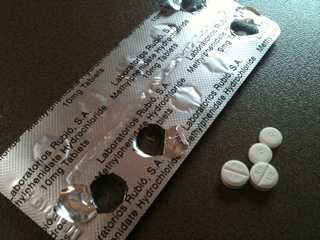This is a cup of coffee and a biscuit type post.
Have you ever wondered what behaviour characteristics are common to a lot of disabilities? Many problems, such as Foetal Alcohol and Attachment Disorder, Pervasive Development Disorders and Language Disorders which are common in Adoption have more pronounced issues along the same lines, but these are things that we should all keep in mind when we are dealing with vulnerable and sensitive children.
You need remember that not all vulnerable children act like vulnerable children and may act aggressively. It is our job as adults, not to judge every child by the impossible standards set by children who are not within the special needs arena.
Once a child attends school, the issues and problems that they face increase by startling amounts. Suddenly they are faced with the sector of society that many of them want nothing to do with in life, but are forced into inclusion. There are some children, and some situations where inclusion works, but the extent of help within our school systems for these children is just not good enough in many cases.
If we add the pressure of social acceptance and the pressures put upon them by teachers who want them to meet academic targets, we can see that it is easy to ask too much of children who are not mature enough to deal with it.
Behaviours that can be seen regularly with many of these disabilities are spread across the spectrum, and one or two of these put together is not going to be recognised as a disability. When we are seeing lots of them together, warning signals should be sounding in parents, teachers and friends heads to get help for them.
You don’t have to listen to me to tell you how many children are being failed by our education system due to costs, you can ask any teacher on a day off with a dry white wine in his/her hand.
I have heard people on social media, ranging from the ridiculous to the sublime and making all sorts of accusations about the people who say they should not be drinking alcohol. Well, l can tell you, that life with a foetal alcohol child can be sheer hell for everyone concerned.
Remember this post when you think about picking up a glass of wine once you know you are pregnant. The only thing the medical profession can agree on is that they DON’T know how much alcohol might affect any child. From that, I read that it could be one glass or it could be 10 glasses a day every day. All children and their tolerances are different.
Contrary to common belief, most foetal alcohol children are probably not born to mothers of raging alcoholics. Most are likely born to women who think that a few glasses of wine regularly won’t do any harm. Sadly, those women tend not to admit having the glasses of wine when they are pregnant and they underestimate it to doctors. Foetal Alcohol Effect as a diagnosis, I suspect is one of the least diagnosed conditions that there are out there. I can see that most of them are diagnosed as having other conditions that are much more socially acceptable to talk about.
Nobody should hide behind that. Every mother knows if she drank alcohol when she was pregnant. If your older children have many of these symptoms, then think seriously about what you are trying to get in place for your children. Pretending it is ADHD when it is Foetal Alcohol might not get them the help they need, and if they have both conditions, then they are really going to struggle. And don’t read into this that every ADHD diagnosed child should really be FAE because that would be very very wrong.
Being diagnosed as foetal alcohol effect – which does not have the facial symptoms – is not socially acceptable though, is it?
Who is going to admit it to a doctor, and how many doctors are going to bring that up with a parent? It is the responsibility of the parent to swallow what they did, accept it and get their children the help that they need – before it is too late. This is the list that applies to a certain lovely little lad that I know with foetal alcohol effect. There may be more symptoms, but I can only tell you what I know about.
On the surface, unlike the children with Full Foetal Alcohol Syndrome who are much more obviously affected, with more profound special needs, the foetal alcohol effect children look unaffected. Many of them seen to have good speech patterns, they tend to learn to read and write easily although they often struggle with the comprehension, and they tend to be able to make their daily needs perfectly well-known.
- ADHD is a common side effect of Foetal Alcohol. They are not the same thing.
- Very young children with FAE are very high needs and over demanding. They are often the kind of children that even at the age of 3 +, you cannot leave them in a room long enough to have a pee.
- Problems with school work and learning academic work, tending to be struggling understanding concepts.
- Difficulty making sense of some commands that are given.
- Speech and language problem at times.
- Difficulty controlling impulses. Rather like not being able to put the brakes on something and charging ahead without thinking.
- Short term memory issues. Learns concepts and then forget them again.
- Under developed conscience. Does not see how what they do might have an effect afterwards.
- Doesn’t see the point of having to adhere to rules.
- Struggles to deal with feelings of anger or inadequacy and may react with rage.
- Any anger from anyone else may mean they react the same way.
- Easily influenced and usually keen to please people which makes them very vulnerable.
- Extreme reactions to being told no, not today, not getting their own way. In most cases it is far and above the reactions of non foetal alcohol children. Even in mild cases, it could show as being overly stubborn.
- Low self confidence and high drive to be accepted and may take the blame for things to be popular. May also struggle to tell the truth and be used as a scapegoat by other children as their short-term memory makes them forget the sequence of events, and nobody believes they can’t remember something that happened 30 minutes ago.
- Teachers lose patience with them as they learn something, then a few weeks later may forget it.
- They often turn into perceived bullies as other children often taunt them when they learn the weakness, and the Foetal Alcohol child then gives the extreme reaction to the situation and gets punished instead of helped. The other children know that by the time they get back to class, the FAE child will struggle to get the sequence of events right.
I have recently been made aware of one other characteristics that affect many children and that is the one on sugar cravings. I know one foetal alcohol child who very much has that, and he will steal to satisfy his cravings for sugar. It was the first time that I had heard that it was a secondary effect of FAE.
———————————————————————————————-
I had to read it in a book. Thank you Brenda McCreight for your book on Recognizing and Managing Children with Fetal Alcohol Syndrome / Fetal Alcohol Effects – A Guidebook.
———————————————————————————————-
How enlightening was it to actually know that it was a behaviour that is quite common with the condition.
I don’t doubt that this is hard reading for some of you, and others may feel some guilt at what the possibilities are for your children if you drink alcohol. I don’t have those hang ups as I did not give birth to my children, but if you suspect that is what your child, or children have got, swallow your pride, see it through and get them the help they need.
———————————————————————————————-
And if you are pregnant and drinking alcohol, then stop now. If there is any damage done already, at least it will stop when you do. I really don’t care if you think I am the overbearing Pregnancy Police, because I live with the effect of someone else’s drinking and how it devastates lives, and I don’t want it to happen to your children.
———————————————————————————————-
I will leave you with the words from @melaina25 from Transatlantic Blonde who hit it on the head in my last post about FAE when she said that there has never been a foetal alcohol baby born to a mother who didn’t drink alcohol.



I just googled this saying and this thread came up I'm neither Scottish or a mum, I'm a Geordie and…
As an 88 year old American, after reading the article(s) and all of the comments, I say "nothing is now…
Been stretching for this song nobody I know knows it I sing it every year my gran use to sing…